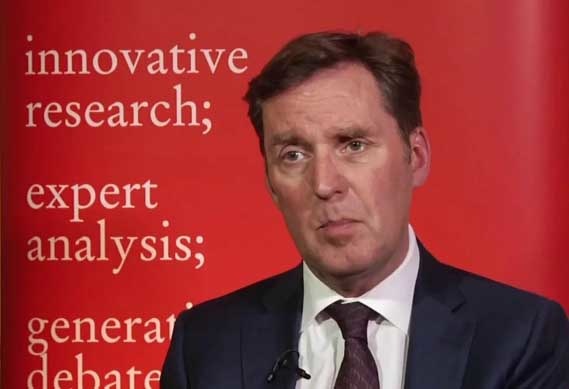
Alan Milburn addressing a meeting of the Nuffield Trust
A BUSINESS MODEL FOR HOSPITALS
So much for introducing private providers into the system. The second objective was to turn NHS hospitals into businesses. The proposal was to establish a category of 'Foundation Trust Hospitals' which "would no longer be supervised by the Department of Health, but by a new independent regulator called Monitor. Monitor would license them to provide a specified number of services each year and would have powers to ensure that they did so, while the Healthcare Commission would check their care quality standards. Otherwise they would be free to provide services as they saw fit. They would be free to borrow on the private financial market, enter into joint ventures with private companies and set their own terms of service for staff. Foundation trusts would thus resemble private companies in all but a few aspects. They could only sell assets with the permission of the Secretary of State, and would not make profits for shareholders (although Monitor would require them to make a 'prudent' surplus); also, to ensure that they remained focused on treating NHS patients, money earned from treating private patients could not exceed its existing proportion of a foundation trust's total income (the 'private patient income cap').
"But the counterpart to their private sector-like freedom was that a foundation trust could go bust. Its contracts would be enforceable in the courts and it would not be able to turn to the department of Health for help if it ran up unsustainable debts. In that event, Monitor could step in and remove the management and invite another foundation trust to take over. Or it could let the foundation trust hospital close, simply ensuring that other providers were available to fill the gap in services. In terms of incentives, this was all important: the bottom line became the overriding measure of success."
Alan Milburn told the House of Commons that "in no way" could the bill "be reasonably described as privatisation or a step in that direction." Foundation Trusts, according to the department of Health, "'have been created to devolve decision making from central government control to local organisations and communities, so they are more responsive to the needs and wishes of local people.'" But "the reality was that foundation trust directors had to have the same freedom as private company directors. Being financially independent meant that every policy decision must be judged first and foremost on its impact on financial viability, rather than on whether, for example, it would meet the needs of this or that category of patient."
The basis of funding for hospitals was changed: "Starting in 2004 with 'elective' procedures (such as knee replacements) and for foundation trust hospitals only, hospitals would be paid per completed treatment, and not with a lump sum for a given total of cases. This was misnamed 'payment by results' - it should have been 'payment by throughput', since whether the treatments are successful or not forms no part of the formula. It was also short of being a full market system in that price competition was ruled out. All payments were based on a national 'tariff' of fixed prices, adjusted for the seriousness of each category of case ... The idea was that hospitals should compete for patients on the basis of the quality of care, not price.
"by the end of 2010 about 60 percent of all NHS hospital care was being paid for on this basis ... It already meant that hospitals were more interested in some kinds of patients than others, because they were more profitable, and that the success of one hospital in attracting patients could mean destabilising the finances of another, with knock-on effects on its ability to keep staff and provide other services.
"But the full significance of 'payment by results' only became fully apparent in December 2010 when the Coalition government let it be known that in future providers could be allowed to offer prices below the national tariff - in effect forcing others to compete on price. The beginnings of a full healthcare market were thus coming into view.
"And so were some of its effects. In July 2010 the government had also announced the scrapping of the private patient income 'cap'. From now on foundation trusts that are well placed to attract private patients ... will be free to step up their private patient intake as much as they wish if this will bring in more money than treating NHS patients ..."
In the middle of the process, in June 2003, Milburn "left the government, citing family reasons. He then became a paid adviser to a clutch of private companies interested in cashing in on the marketisation of the NHS: Bridgepoint Capital, a venture capital company involved in financing Alliance Medical and other firms seeking NHS business; Lloyds Pharmacy; Covidien, an American manufacturer of orthotics [material such as 'insoles, braces, splints, callipers, footwear, spinal jackets and helmets which help people recover from or avoid injury, or live with lifelong conditions' - PB, from the NHS England website]; and last but not least, Pepsico ..." The relevance of Pepsico may be a little obscure but in 2010 they were invited by Andrew Lansley "to join a 'network' of businesses to help write government policy on obesity and diet-related diseases."